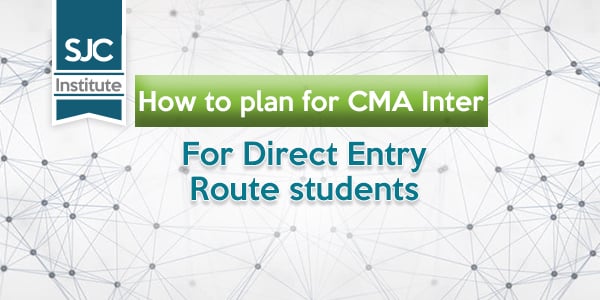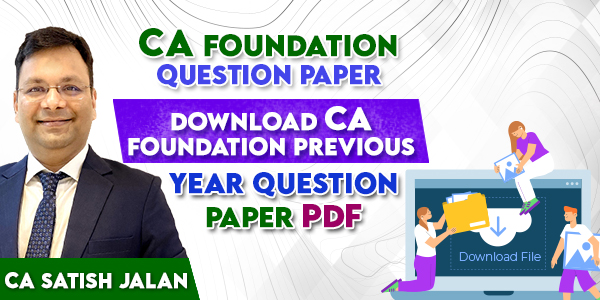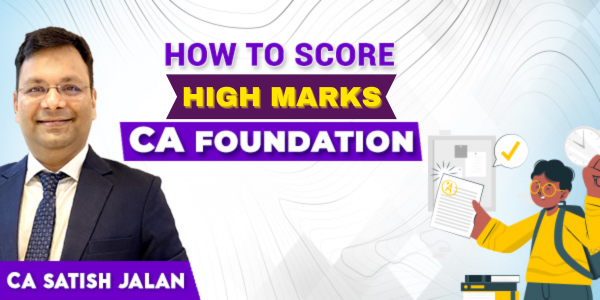15
Jan, 2021
How to plan for CMA Inter for Direct Route students
-
CMA Inter | Direct Entry Route
CA Satish Jalan
The Institute allows you to enter directly to its Intermediate Course under the following scenarios -
- Graduate of any Discipline (excluding performing art, music)
- Pursuing Engineering Course (having completed 2nd year / Semester IV/ equivalent) or Qualified Engineers
- Qualified Foundation Examination conducted by the Institute of Company Secretaries of India
- Qualified for the Intermediate Examination conducted by the Institute of Chartered Accountants of India
Candidates awaiting the results of degree examinations may also apply for provisional admission. Such students would be provided a time period of 18 (eighteen) months to convert from Provisional to Regular Status.
It is said that - “If you fail to plan well, you are planning to fail”. So, you need to plan your study timeline well in advance to crack the examination in one shot.
Which are the Subjects to be studied at CMA Intermediate Level?
CMA Intermediate level comprises 8 subjects divided into Group I and Group II, each group having four subjects as mentioned below:
Group I:
Financial Accounting
Laws and Ethics
Direct Taxation
Cost Accounting
Group II:
Operations Management and Strategic Management
Cost and Management Accounting and Financial Management
Indirect Taxation
Company Accounts and Audit
Within what time should you register for the Examination?
|
Examination Term |
Last date of registration |
|
June term |
31st January of same year |
|
December term |
31st July of same year |
How to decide whether to appear for both groups or one group at a time?
The Institute allows you to appear for one group or both groups at a time. It is always advisable to prepare for both groups at a time to pass your CMA Exam at the earliest. However, you may decide to appear for a single group due to time or any other constraints.
Appearing for both groups simultaneously increases the probability of clearing the examination due to the set-off benefit.
Say, your score is as follows:
- Aggregate of Group I - 210 and
- Aggregate of Group II - 195
- 40+ in every subject individually.
- The total aggregate score is 405/800 (more than 50%) in both groups.
If you appear in both groups, you will pass this exam due to the set-off effect. Whereas, if you have appeared in a single group at a time, you will pass in Group I (as the aggregate score is more than 50%) and you will have to re-appear for Group II (as the aggregate score is less than 50%)
Read More :
How to plan for CMA Inter for just passed CMA Foundation Students
What should be your Average Study time per day?
The following table illustrates the detailed preparation time for the Intermediate exams in 3 cases-
- If you appear for Both Groups - A minimum of 10 months of study time required
- If you appear for Group I only - A minimum of 6 months of study time required
- If you appear for Group II only - A minimum of 6 months of study time required
|
Both Groups |
Only Group I |
Only Group II |
|
|
Preparation Time |
8 months |
4 months |
4 months |
|
Revision Time |
2 months |
2 months |
2 months |
|
Number of classes per subject |
On average 70 classes of 2.5 hours each per subject |
On average 70 classes of 2.5 hours each per subject |
On average 70 classes of 2.5 hours each per subject |
|
Total number of hours to be studied per subject |
70 classes x 2.5 hours x 8 subjects = 1400 hours |
70 classes x 2.5 hours x 4 subjects = 700 hours |
70 classes x 2.5 hours x 4 subjects = 700 hours |
|
Average Study Hours per day |
1400 / 8 months / 25 days per month = 7 hours/day |
700 / 4 months / 25 days per month = 7 hours/day |
700 / 4 months / 25 days per month = 7 hours/day |
|
Number of classes to be done each day |
7 hours / 2.5 = 3 classes approx |
7 hours / 2.5 = 3 classes approx |
7 hours / 2.5 = 3 classes approx |
Please Note:
- As per this timeline, you are required to do the classes for 6 days a week i.e., on an average 25 days per month and 1 day per week should be devoted to Revision and for referring to the Institute's Study Material of the topics that have been covered during the week for every subject.
- The above timeline has been prepared to assume that you are taking classes for every subject. However, if you are not taking classes for any particular subject then you should do an equivalent amount of self-study for that subject as per the timeline to keep the preparation for all subjects at par.
What is the suggested Study Plan which I should follow to complete my preparation?
Case 1: If you are preparing for Both Groups
|
Days -Time Slots |
Morning |
Afternoon |
Evening |
|
Monday |
Cost Accounting |
Sub 1 - Direct Taxation Sub 2 - Indirect Taxation |
Law |
|
Tuesday |
Sub 1 - Direct Taxation Sub 2 - Indirect Taxation |
Sub 1- Financial Accounting Sub 2 - Company Accounts |
Law |
|
Wednesday |
Cost Accounting |
Sub 1- Financial Accounting Sub 2 - Company Accounts |
Sub 1 - Financial Management Sub 2 - Cost Gr 2 |
|
Thursday |
Sub 1 - Direct Taxation Sub 2 - Indirect Taxation |
Sub 1- Financial Accounting Sub 2 - Company Accounts |
Sub 1 - Financial Management Sub 2 - Cost Gr 2 |
|
Friday |
Cost Accounting |
Sub 1- Financial Accounting Sub 2 - Company Accounts |
OM-SM |
|
Saturday |
Sub 1 - Direct Taxation Sub 2 - Indirect Taxation |
OM-SM |
Audit |
|
Sunday |
Sub 1 - Direct Taxation Sub 2 - Indirect Taxation |
Backlog and Revision |
|
Note:
- This Study Plan has been prepared to assume that you will initially invest in 5 or 6 subjects and after completing them you will invest in the other subjects.
- You are advised to study Financial Accounting, Direct Taxation, and Financial Management for the first 4 months and then start Company Accounts, Indirect Taxation, and Cost Gr 2 during the remaining 4 months in the same time slots to avoid stress and maintain a balance.
- This timetable has been prepared to assume that each subject comprises 70 classes on average. However, the number of classes may vary (may be more or less) depending on the subjects. So, once you finish the classes of a particular subject (which has fewer classes) according to this schedule, you must utilize that time slot to complete the additional classes of other subjects (which has more classes)
- If you are unable to complete the classes of any subject as per this time schedule, you should do 2 classes on Sundays to make for the difference.
Case 2: If you are preparing for Group I only
|
Days-Time Slots |
Morning |
Afternoon |
Evening |
|
Monday |
Cost Accounting |
Financial Accounting |
Direct Taxation |
|
Tuesday |
Law |
Financial Accounting |
Direct Taxation |
|
Wednesday |
Cost Accounting |
Financial Accounting |
Direct Taxation |
|
Thursday |
Law |
Financial Accounting |
Direct Taxation |
|
Friday |
Cost Accounting |
Financial Accounting |
Law |
|
Saturday |
Cost Accounting |
Law |
Direct Taxation |
|
Sunday |
Backlog and Revision |
||
Note:
- This timetable has been prepared to assume that each subject comprises 70 classes on average. However, the number of classes may vary (may be more or less) depending on the subjects. So, if you finish any of the classes earlier you may utilize that time slot for completing other classes or for revision purposes.
Case 3: If you are preparing for Group II only
|
Days-Time Slots |
Morning |
Afternoon |
Evening |
|
Monday |
Financial Management |
Company Accounts |
Indirect Taxation |
|
Tuesday |
OM-SM |
Company Accounts |
Indirect Taxation |
|
Wednesday |
Financial Management |
Company Accounts |
Indirect Taxation |
|
Thursday |
OM-SM |
Cost Group 2 |
Indirect Taxation |
|
Friday |
Financial Management |
Cost Group 2 |
Audit |
|
Saturday |
OM-SM |
Cost Group 2 |
Audit |
|
Sunday |
Backlog and Revision |
||
Note:
- This timetable has been prepared to assume that each subject comprises 70 classes on average. However, the number of classes may vary (may be more or less) depending on the subjects. So, if you finish any of the classes earlier you may utilize that time slot for completing other classes or for revision purposes.
- You are advised to complete the classes of OM first and then start with SM classes.
You can study 700 marks of your CMA Inter with SJC under one roof. We provide you a single window support for your different subjects.
To know about the Courses that we teach - Click here.
Click the button below to read about the preparation strategies for CMA Online Exams.
see more: All About CMA Inter
Do not miss watching these important videos!
How to do Self Study during Tuition?
Popular Posts







5 Comments